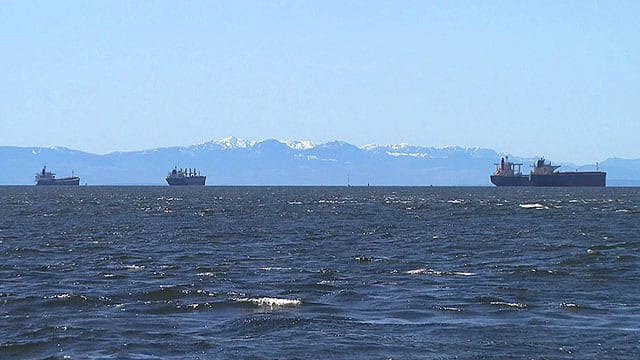
A coastal British Columbia First Nation that experienced a spill of thousands of litres of diesel in its waters is supporting the province’s efforts to create a permitting system for companies transporting hazardous substances.
The B.C. Court of Appeal is hearing a reference case filed by the province that asks whether it can create such a system, which would require companies to file disaster management plans and agree to pay for any damages.
Marilyn Slett, chief of the Heiltsuk Nation, said her community’s experience revealed gaps in federal spill response. The sunken tug Nathan E. Stewart spilled 110,000 litres of diesel fuel near Bella Bella in late 2016.
“The day the spill happened, our people were out there. They were out in their boats, they were there trying to help with any of the recovery. What we noticed is there isn’t room for Indigenous people and Indigenous governance within the spill response regime,” she said in an interview.
B.C. concluded its arguments before the Appeal Court on Tuesday. A lawyer representing the province said the proposed changes to its Environmental Management Act won’t allow B.C. to refuse a permit to a pipeline operator without cause.
The governments of Canada, Alberta and Saskatchewan have not yet had an opportunity to deliver arguments in court, but they say Ottawa – not provinces – has jurisdiction over inter-provincial projects such as the Trans Mountain pipeline expansion.
Canada says in court documents that the proposed amendments must be struck down because they give the province a “veto” over such projects.
Slett said she believes that if B.C.’s proposed system had been in place when the Nathan E. Stewart sank, the recovery would be further along now. She also hopes the province’s regime, if approved, will incorporate Indigenous knowledge of their territories.
“Our people know our areas. They know the tides. They know the weather patterns,” she said.
The Heiltsuk have joined other First Nations, the B.C. cities of Vancouver and Burnaby, Ecojustice and the Assembly of First Nations in supporting B.C.’s proposal in court.
In court documents, the Assembly of First Nations says the answers to the constitutional questions in the case will have far-reaching consequences for Indigenous Peoples when it comes to natural resources and energy activities on their lands.
“The proposed hazardous substance permits must be interpreted in a way that the rights and authorities of First Nation peoples are recognized, respected and part of the construction process,” it says.
Front lines
The City of Vancouver says in court documents that local and First Nations governments are on the front lines of emergency response and will suffer the impacts of a heavy oil spill.
“The proposed amendments recognize the important role that emergency preparedness and response planning by local governments and First Nation governments will play in the event of an accidental release of heavy oil and the need to ensure that they are properly resourced to respond,” it says.
Joseph Arvay, a lawyer for B.C., told court on Tuesday the proposed amendments only allow the province to refuse to issue a permit or revoke one in cases where the operator fails to follow conditions imposed upon it.
He added that if the operator finds the conditions too onerous, it can appeal to the independent Environmental Appeal Board, or in the case of Trans Mountain, the National Energy Board.
The energy board has set up a process where Trans Mountain Corp. can argue that a condition is too burdensome and violates the special status of inter-provincial projects, he said.
“The NEB effectively gets the last word … but it’s going to be condition by condition, law by law,” Arvay told the panel of five judges.
Arvay said the law would be unconstitutional if it declared an absolute prohibition on pipelines in B.C., but the amendments only impose conditions on trans-boundary projects.
When Premier John Horgan announced the proposed changes last year, Alberta Premier Rachel Notley accused him of breaking the rules of Confederation and declared a short-lived ban on B.C. wines.
The federal government has purchased the Trans Mountain pipeline expansion, which would triple the capacity of the existing line from the Edmonton area to Burnaby and increase tanker traffic in Burrard Inlet seven-fold.
Trans Mountain Corp., the Canadian Association of Petroleum Producers, Enbridge Inc., the Railway Association of Canada and the Lax Kw’alaams Indian Band are among those that have filed court documents in support of the Canadian government in the reference case.











what concerns me, still, is how many companies file for Bankruptcy rather than face these kinds of obligations when they’re incurred! Still not worth the risk I say……